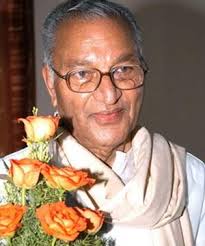Gummadi Venkateswara Rao
| Gummadi Venkateswara Rao | |
|---|---|
| Born | 9 July 1925 Ravikampadu near Tenali,Andhra Pradesh, India |
| Died | 26 January 2010 (aged 82) Hyderabad, India |
| Occupation | Character actor |
| Years active | 1950–2010 |
Gummadi Venkateswara Rao (9 July 1925 – 26 January 2010), popularly known as Gummadi, was a popular Telugu film character actor. Though he began to act in films much later than famous artistes like N.T.Rama Rao and Akkineni Nageswara Rao he had through the course of his career acquired a niche for himself vis a vis the character roles of brother, father etc. which he often undertook.
Early life
He was born in Ravikampadu near Bhattiprolu, Guntur District of Andhra Pradesh, India. According to one of his interviews, he studied in Hindu College (Guntur).
Career
Gummadi's acting career extended from 1950 onwards for almost six decades and he worked with three generations of people in the film industry. Though young, he used to play the dignified roles of relatively elderly people at the beginning. He was a versatile character actor in sociopolitical and mythological movies. He acted in nearly 500 movies. He played the role of father to many lead actors in old Telugu films.
Gummadi Venkateswara Rao first appeared as an actor in 1942, where he played the role of an old man on the stage. He began his cinema career with Adrushtadeepudu (1950) and continued on for about 500 more films portraying roles ranging from the hero, the villain, and the character artiste, to roles with a slight comedic bent, such as his guest appearance in Missamma (1955). Gummadi's excellent portrayal of middle-age roles, even playing father to artistes who are older than he, such as NTR and ANR, made his name synonymous with that of a typical middle-age man.
His roles in Thodu Dongalu (1954) and Mahamantri Timmarusu (1962) alongside NTR brought him appreciable critical acclaim, with the former film winning the President's Award and the latter conferring him the National Award for Best Supporting Actor. His roles in several films were much appreciated, but roles in Maya Bazar (1957), Maa Inti Mahalakshmi (1959), Kula Daivam (1960), Kula Gothralu (1962), Jyothy (1977), Nelavanka (1981), Maro Malupu (1982), Ekalavya(1982), Ee Charitra Ye Siraatho? (1982), Gaaju Bommalu (1983), Pelli Pusthakam (1991) stand out from the rest and some won him awards. Gummadi won several awards as Best Supporting Actor in his career, the President's Silver Medal and Telugu University's honorary doctorate (in 1963) for essaying the title role in Mahamantri Timmarusu and the Best Actor Award for his role in Maro Malupu.
Sree Gummadi Venkateswara Rao served as jury member thrice on the National Film Awards, twice on the Nandi Awards Committee (and twice more as chairperson), and was on the Selection Committee for the NTR Award and Raghupati Venkayya Award. He wrote his memoirs in filmdom and brought them out as an autobiographical titled teepi gurtulu-chEdu j~naapakaalu. When his role needed to be dubbed for Aayanakiddaru (1995) due to his ill health, the veteran artiste who was very popular for his voice decided to quit acting, but he acted again in the title character of Jagadguru Sree Kasi Nayana Charitra (2008) as the role would match his real age and voice.
Characters played by him
|
Personal life
Gummadi was married and had five daughters and two sons. He died of multiple organ failure at Care hospital, Hyderabad on 26 January 2010. His last public appearance was at the screening of Maya Bazar which had since been colorized. Here he expressed his happiness and said that "Watching this great movie in colour probably could have been the only reason for me to have stayed alive for so long."
Filmography
This is partial filmography of Gummadi. Kindly help expanding it.
Writing
- Gummadi has written his memoirs of Telugu cinema in Teepi Gurthulu and Chedu Jnapakalu.
Awards
- He was awarded the prestigious Raghupathi Venkaiah Award by the Government of Andhra Pradesh.
- He won Nandi Award for Best Supporting Actor for his role in Maro Malupu in 1982.
No comments:
Post a Comment